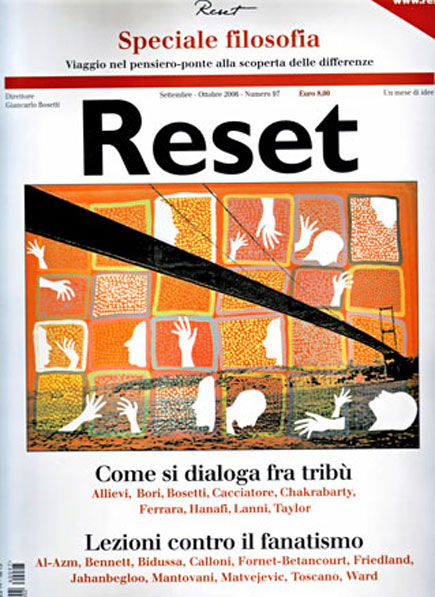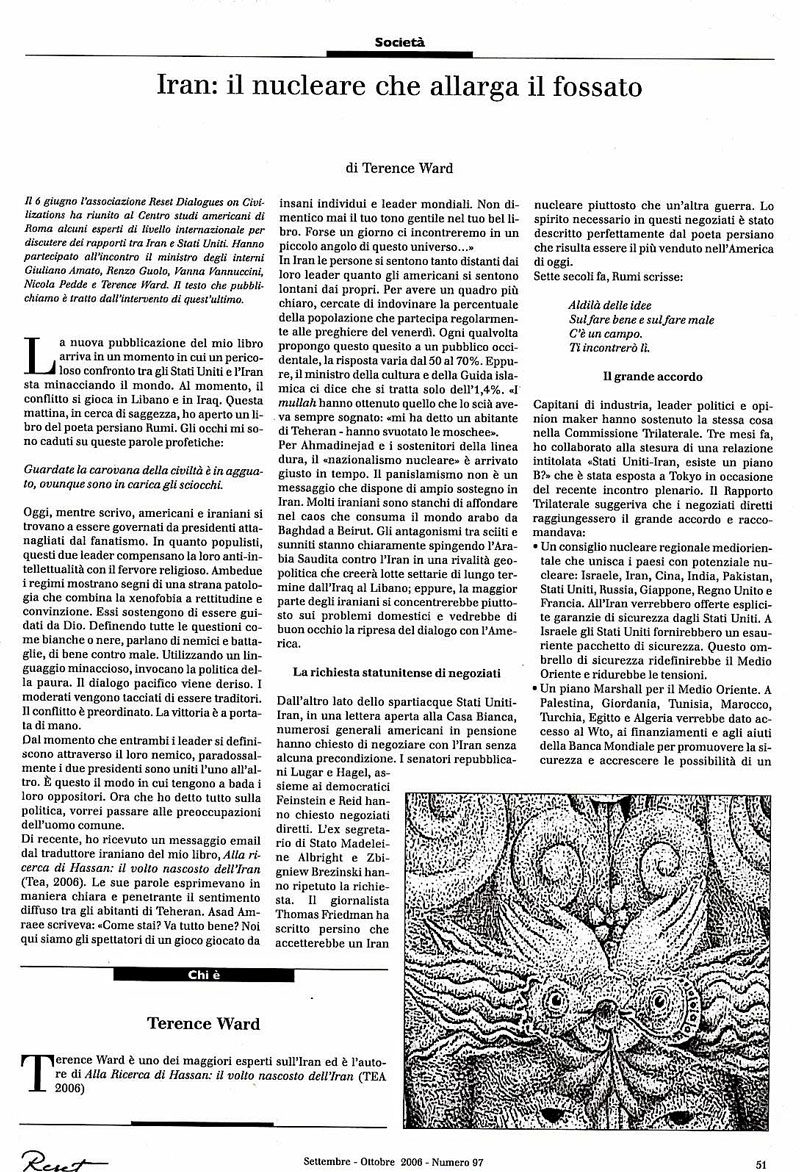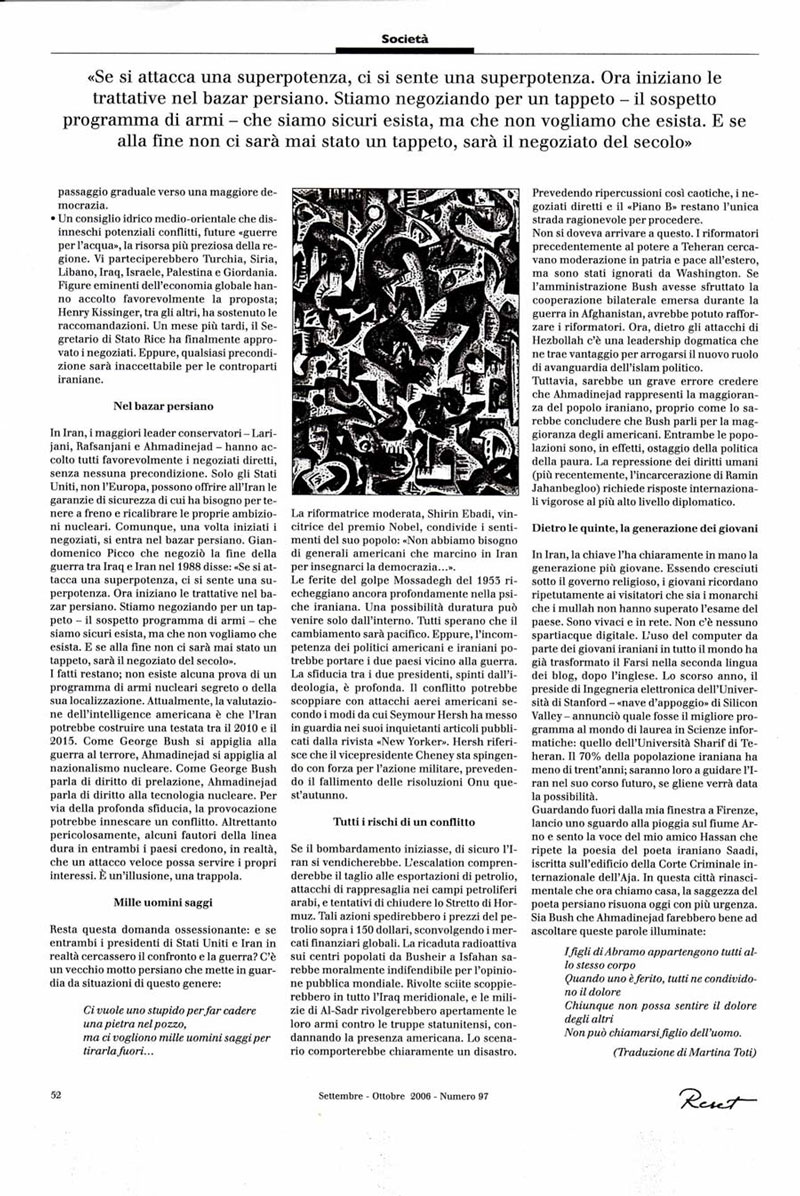Adapted from a speech delivered at the Centro Studi Americani Rome, June 6, 2006
The last time I spoke here before you with Abraham Yehoshua, I told you the story of my journey back to Iran searching for our lost friend Hassan, who had raised us as children during our ten years in Tehran before the revolution. Now, the new publication of my book arrives at a time when a dangerous confrontation between the US and Iran now threatens the world. At the moment, the conflict is being played out in Lebanon and Iraq. This morning, seeking wisdom, I opened a book of Rumi, the Persian poet. My eyes fell on these prophetic words:
Behold the caravan of civilization is ambushed,
everywhere fools are in charge.
Today, as I write, Americans and Iranians find themselves ruled by presidents bonded by zealotry. As populists, these two leaders compensate for their anti- intellectuality with religious fervor. Both regimes show signs of a curious pathology that combines xenophobia with righteousness and conviction. They claim divine guidance. Defining all issues as black and white, they speak of enemies and battles, of good against evil. Using threatening language, they summon the politics of fear. Peaceful dialogue is mocked. Moderates are branded as traitors. Conflict is pre- ordained. Victory is at hand.As both leaders define themselves by their enemy, the two presidents, ironically, are wedded to each other. This is how they keep their opponents at bay. Now that I have all spoken about politics, I would like to turn to the cares of the common man.
The View from Iran
Recently, I received an email from the Iranian translator of my book, Alla ricerca di Hassan: il volto nascosto dell’Iran. His words clearly and poignantly spelled out the pervading sentiment among Tehranis. Asad Amraee wrote:How are you? Is everything going for you? We are here an onlooker of the game of crazy people and decision makers of the world. I never forget your kind tone in your nice book. Maybe some time in a small corner of this universe, we will meet each other…In Iran, people feel as distant from their leaders as Americans feel from theirs. To have a clearer picture, try and guess the percentage of the population regularly attending Friday prayers number. Whenever I put this question before a Western audience, their answers range from 50 – 70%. Yet, the Ministry of Guidance and Culture tells us the number is only 1.4%. “The mullahs have achieved what the Shah always dreamed of,” a Tehran resident told me, “they have emptied the mosques.”For Ahmedinejad and the hard-liners, “nuclear nationalism” arrived just in time. Pan-Islamism was not a message that commands wide-spread support in Iran. Many Iranians are wary of sinking into the chaos consuming the Arab world from Baghdad to Beirut. Shiite-Sunni antagonisms are clearly pitting Saudi Arabia against Iran in a geo-political rivalry that will create long-term sectarian struggles from Iraq to Lebanon. Yet, most Iranians would rather focus on problems at home, and see the dialogue with America restored.
US Call for Negotiations
On the other side of the US-Iranian divide, in an open letter to the White House, numerous retired American generals have called for negotiations with Iran with no preconditions. Leading Republican Senators Lugar and Hagel along with Democrats Feinstein and Reid demanded direct negotiations. Ex-Secretary of State Madeleine Albright and Zbigniew Brzezinski echoed the call. Journalist Thomas Friedman even wrote that he would accept a nuclear Iran over another war. The spirit needed in such negotiations is described best by the Persian poet who happens to be the best-selling poet in America today. Seven centuries ago, Rumi wrote:Out beyond the idea
Of right-doing and wrong-doing
There is a field.
I’ll meet you there.
The Grand Bargain
Captains of industry, political leaders, and opinion makers in the Trilateral Commission have argued the same. Three months ago, I collaborated on a paper entitled “US- Iran, Is there a Plan B?” that was delivered in Tokyo at the recent plenary meeting. The Trilateral Report advised direct negotiations to achieve The Grand Bargain with recommendations of:
– Regional Middle East Nuclear Council – uniting countries with nuclear capabilities: Israel, Iran, China, India, Pakistan, United States, Russia, Japan, the UK and France. Iran would be offered explicit US security guarantees. Israel would be provided with a comprehensive security package by the United States. This security umbrella would re-define the Middle East and reduced tensions.
– Middle East Marshall Plan – Palestine, Jordan, Tunisia, Morocco, Turkey, Egypt and Algeria given access to WTO, World Bank funding and Aid to promote security and enhance the chances of a gradual transformation towards more democracy.
– Middle East Water Council – diffusing potential conflicts, future “water wars” over the region’s most precious resource. Membership given to Turkey, Syria, Lebanon, Iraq, Israel, Palestine, and Jordan.Leading figures in the global economy welcomed the proposal; Henry Kissinger, among others, backed the recommendations. A month later, Secretary of State Rice finally warmed to negotiations. Yet, any pre-conditions will be unacceptable for the Iranian counterparts.
Inside the Persian Bazaar
In Iran, senior conservative leaders–Larijani, Rafsanjani, and Ahmedinejad–all welcome direct negotiations, with no pre-conditions. Only the US, not Europe, can offer Iran the security guarantees it needs to curb and re-calibrate its nuclear ambitions. However, once negotiations begin, one enters the Persian Bazaar. Giandomenico Picco who negotiated the end of the Iraq-Iran war in 1988 said: “If you engage a superpower, you feel you are a superpower. Now the haggling in the Persian bazaar begins. We are negotiating over a carpet–the suspected weapons program–that we are sure exists, that we don’t want to exist. And if at the end there never was a carpet, it will be the negotiation of the century.”
The Trap
The American intelligence estimate is that Iran could build a warhead sometime between 2010 and 2015. Just as George Bush seized on the War on Terror; Ahmedinejad has seized on nuclear nationalism. As George Bush speaks of right of pre-emption, Ahmedinejad speaks of the right of nuclear technology. Because of deep mistrust, there is a great danger that may trigger a conflict. As dangerous, some key hard-liners in both countries believe that a quick strike may serve their interests. It is an illusion, a trap.
A Thousand Wise Men
One troubling question remains: What if both the US and Iranian presidents actually seek confrontation and war? There is an old Persian that warns of such situations:It takes one fool to drop a stone in the well,
but it takes 1,000 wise men to take it out. Moderate reformer, Shirin Ebadi, Nobel Prize Laureate echoes the sentiment of her people, “we don’t need American generals marching into Iran to teach us about democracy…” The wounds of the Mossadegh coup of 1953 still resonate profoundly in the Iranian psyche. Lasting change can only come from within. All pray that the change will be peaceful.Yet, the incompetence of American and Iranian politicians may bring the countries close to war. The distrust between the two ideologue-driven Presidents is profound. Conflict could well unfold with Israeli or American air strikes of nuclear sites along the lines that Seymour Hersh has reported in his groundbreaking and disturbing articles in the New Yorker.
Imminent Danger
If bombing begins, Iran will surely retaliate. Escalation will include cutting off oil exports, retaliatory attacks on Arabian oil fields, and attempts to close the Straits of Hormuz. Such acts will send oil prices above the $150 mark, shocking global financial markets. Radioactive fall-out over population centers from Busheir to Isfahan will be morally indefensible in world public opinion. Shiite rioting will break out across the southern Iraq, and Al-Sadr’s militias will openly turn their guns on US troops, dooming the American presence. The bombing scenario will clearly spell disaster. Anticipating such chaotic repercussions, direct negotiations and “Plan B” remain the only sane way forward.It did not have to come to this. The reformists formerly in power in Tehran sought moderation at home and peace abroad, but were ignored by Washington. Had the Bush administration taken advantage of the bilateral cooperation that emerged amid the war in Afghanistan, it could have empowered the reformers. Now, a dogmatic leadership is behind Hezbollah’s forays and capitalizing on them in presuming the new role as vanguard of political Islam.But, it would be a grave mistake to believe that Ahmadinejad represents the majority of the Iranian people, just as it would be to conclude that Bush speaks for the majority of Americans. Both populations are, in effect, hostages to the politics of fear. Repression of human rights (most recently the imprisonment of Ramin Jahanbegloo) demands vigorous international responses at the highest diplomatic level.
In the Wings, the Young Generation
In Iran, the younger generation clearly holds the key. Having grown up under clerical rule, the young repeatedly remind visitors both monarchs and mullahs have failed the country. They are bright and connected. There is no digital divide. Already, the use of computers by young Iranians across the globe has turned Farsi into the second blogging language on the internet after English. Last year, the Dean of Electrical Engineering at Stanford University—mother ship of Silicon Valley— announced the finest undergraduate computer science program in the world: Sharif University of Tehran. Seventy per cent of Iran’s population is under 30; it is they who will steer Iran on its future course, given the chance.Looking out from my window in Florence, I gaze at rains over the River Arno and hear my friend Hassan’s voice repeating the poem of the Iranian poet Saadi that is inscribed above the International Criminal Court in the Hague. In this Renaissance city that I now call home, the Persian poet’s wisdom resonates with more urgency today. Both Bush and Ahmedinejad would do well to listen to his illuminated words.“Children of Adam are all members of the same body
When one is wounded, all share the pain
Whoever cannot feel the pain of others,
Cannot call himself son of man.”
Terence Ward is a leading expert on Iran and author of Alle Ricerca di Hassan: il volto nascosto dell’Iran (TEA Longanesi, Maggio 2006).



